Related Research Articles

Let It Be is the twelfth and final studio album by the English rock band the Beatles. It was released on 8 May 1970, almost a month after the group's public break-up, in tandem with the documentary of the same name. Concerned about recent friction within the band, Paul McCartney had conceived the project as an attempt to reinvigorate the group by returning to simpler rock 'n' roll configurations. Its rehearsals started at Twickenham Film Studios on 2 January 1969 as part of a planned television documentary showing the Beatles' return to live performance.

"Something" is a song by the English rock band the Beatles from their 1969 album Abbey Road. It was written by George Harrison, the band's lead guitarist. Together with his second contribution to Abbey Road, "Here Comes the Sun", it is widely viewed by music historians as having marked Harrison's ascendancy as a composer to the level of the Beatles' principal songwriters, John Lennon and Paul McCartney. Two weeks after the album's release, the song was issued on a double A-side single, coupled with "Come Together", making it the first Harrison composition to become a Beatles A-side. The pairing was also the first time in the United Kingdom that the Beatles issued a single containing tracks already available on an album. While the single's commercial performance was lessened by this, it topped the Billboard Hot 100 in the United States as well as charts in Australia, Canada, New Zealand and West Germany, and peaked at number 4 in the UK.
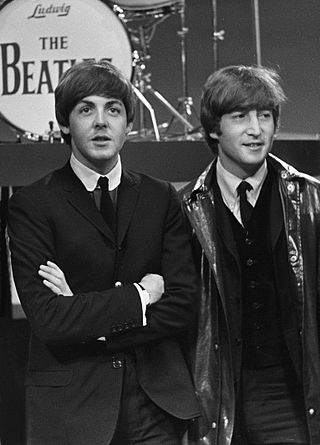
Lennon–McCartney was the songwriting partnership between English musicians John Lennon (1940–1980) and Paul McCartney of the Beatles. It is widely considered one of the greatest, best known and most successful musical collaborations ever by records sold, with the Beatles selling over 600 million records worldwide as of 2004. Between 5 October 1962 and 8 May 1970, the partnership published approximately 180 jointly credited songs, of which the vast majority were recorded by the Beatles, forming the bulk of their catalogue.

"Hello, Goodbye" is a song by the English rock band the Beatles, written by Paul McCartney and credited to Lennon–McCartney. Backed by John Lennon's "I Am the Walrus", it was issued as a non-album single in November 1967, the group's first release since the death of their manager, Brian Epstein. The single was commercially successful around the world, topping charts in the United States, the United Kingdom, France, West Germany, Canada, Australia and several other countries.
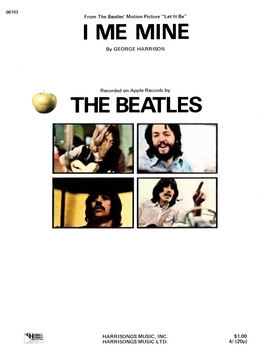
"I Me Mine" is a song by the English rock band the Beatles from their 1970 album Let It Be. Written by George Harrison, it was the last new track the group recorded before their break-up in April 1970. The song originated from their January 1969 rehearsals at Twickenham Film Studios when they were considering making a return to live performance. Written at a time of acrimony within the group, the lyrics lament humankind's propensity for self-centredness and serve as a comment on the discord that led to Harrison temporarily leaving the Beatles. The musical arrangement alternates between waltz-time verses and choruses played in the hard rock style.
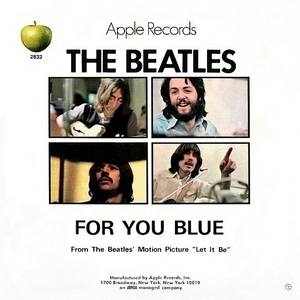
"For You Blue" is a song by the English rock band the Beatles from their 1970 album Let It Be. The track was written by George Harrison as a love song to his wife, Pattie Boyd. It was also the B-side to the "Long and Winding Road" single, issued in many countries, but not Britain, and was listed with that song when the single topped the US Billboard Hot 100 and Canada's national chart in June 1970. On the Cash Box Top 100 chart, which measured the US performance of single sides individually, "For You Blue" peaked at number 71.

"Things We Said Today" is a song by the English rock band the Beatles, written by Paul McCartney and credited to Lennon–McCartney. It was released in July 1964 as the B-side to the single "A Hard Day's Night" and on their album of the same name, except in North America, where it appeared on the album Something New. The band recorded the song twice for BBC Radio and regularly performed an abbreviated version during their 1964 North American tour.
"Dig a Pony" is a song by the English rock band the Beatles from their 1970 album Let It Be. It was written by John Lennon and credited to Lennon–McCartney. The band recorded the song on 30 January 1969, during their rooftop concert at the Apple Corps building on Savile Row in central London.
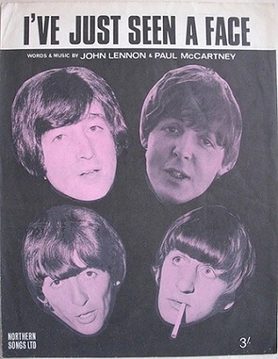
"I've Just Seen a Face" is a song by the English rock band the Beatles. It was released in August 1965 on their album Help!, except in North America, where it appeared as the opening track on the December 1965 release Rubber Soul. Written and sung by Paul McCartney, the song is credited to the Lennon–McCartney partnership. The song is a cheerful love ballad, its lyrics discussing a love at first sight while conveying an adrenaline rush the singer experiences that makes him both enthusiastic and inarticulate.
"Mr. Moonlight" is a song written by Roy Lee Johnson and recorded by Dr. Feelgood and the Interns in 1962. The song was covered by the Beatles on their 1964 albums Beatles for Sale and Beatles '65.

"Old Brown Shoe" is a song by the English rock band the Beatles. Written by George Harrison, the group's lead guitarist, it was released on a non-album single in May 1969, as the B-side to "The Ballad of John and Yoko". The song was subsequently included on the band's compilation albums Hey Jude, 1967–1970 and Past Masters, Volume Two. Although "Old Brown Shoe" remains a relatively obscure song in the band's catalogue, several music critics view it as one of Harrison's best compositions from the Beatles era and especially admire his guitar solo on the track.

"Dig It" is a song by the English rock band the Beatles from their 1970 album Let It Be. The song is credited to Lennon/McCartney/Harrison/Starkey, and is one of the few songs to be credited to all of the Beatles. This song and the 39-second "Maggie Mae" appear on the Let It Be album, but are excluded from the Let It Be... Naked album, instead being replaced with "Don't Let Me Down". Glyn Johns' May 1969 version of the album, then titled Get Back, had a four-minute excerpt of "Dig It", which was later reduced to the much shorter version in the final album.
"She's a Woman" is a song by the English rock band the Beatles, written primarily by Paul McCartney and credited to Lennon–McCartney. It was released on a non-album single in November 1964 as the B-side to "I Feel Fine", except in North America, where it also appeared on the album Beatles '65, released in December 1964. Though it was the B-side, it charted in the US, reaching number four on the Billboard Hot 100 and number eight on the Cash Box Top 100. The song originated in McCartney's attempt to write a song in the style of Little Richard. The lyrics include the first reference to drugs in a Beatles song, with the line "turn(s) me on" referring to marijuana.
"All Things Must Pass" is a song by English rock musician George Harrison, issued in November 1970 as the title track to his triple album of the same name. Billy Preston released the song originally – as "All Things (Must) Pass" – on his Apple Records album Encouraging Words (1970) after the Beatles had rehearsed the song in January 1969 but did not include it on their Let It Be album. The composition reflects the influence of the Band's sound and communal music-making on Harrison, after he had spent time with the group in Woodstock, New York, in late 1968. In his lyrics, Harrison drew inspiration from Timothy Leary's poem "All Things Pass", a psychedelic adaptation of the Tao Te Ching.

"In Spite of All the Danger" is the first song recorded by the Quarrymen, then consisting of John Lennon, Paul McCartney, George Harrison, pianist John Lowe, and drummer Colin Hanton.

Let It Be is a 1970 British documentary film starring the Beatles and directed by Michael Lindsay-Hogg. The film documents the group's rehearsing and recording songs in January 1969 for what was to become their twelfth and final studio album Let It Be. The film includes an unannounced rooftop concert by the group, the last public performance of the four together.

"Teddy Boy" is a song by Paul McCartney included on his first solo album McCartney, released in April 1970. According to Ernie Santosuosso of The Boston Globe, it describes the way in which a close relationship between a widow and her grown son Teddy boy is destroyed by her new romantic interest.

"Ain't She Sweet" is a song composed by Milton Ager, with lyrics by Jack Yellen. It was published in 1927 by Ager, Yellen & Bornstein, Inc. It became popular in the first half of the 20th century and typified the Roaring Twenties. Like "Happy Days Are Here Again" (1929), it became a Tin Pan Alley standard. Both Ager and Yellen were elected to the Songwriters Hall of Fame.
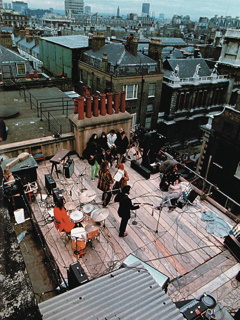
On 30 January 1969, the Beatles performed an impromptu concert from the rooftop of their Apple Corps headquarters at 3 Savile Row, in central London's office and fashion district. Joined by guest keyboardist Billy Preston, the band played a 42-minute set before the Metropolitan Police arrived and ordered them to reduce the volume. It was the final public performance of their career. They performed nine takes of five new songs as crowds of onlookers, many on lunch breaks, congregated in the streets and on the rooftops of nearby buildings to listen. The concert ended with "Get Back", and John Lennon joking, "I'd like to say thank you on behalf of the group and ourselves, and I hope we've passed the audition."
References
Notes
- ↑ In his 1992 book The Complete Beatles Chronicle, Lewisohn writes the Quarrymen performed the song from 1957 through 1959, [14] but in his 2013 book Tune In , he writes the song was likely written sometime between January and May 1958. [3]
- ↑ The three were sometimes dubbed either the "Threatles" or the "Threetles". [22]
Citations
- ↑ The Beatles 2000, p. 97.
- 1 2 3 Lewisohn 1988, p. 12.
- 1 2 3 Lewisohn 2013a, p. 171.
- 1 2 Lewisohn 2013a, p. 820n37.
- ↑ Lewisohn 2013a, pp. 16, 820n37.
- 1 2 Unterberger 2006, p. 357.
- ↑ Everett 2001, p. 372n30.
- ↑ Ingham 2009, p. 7.
- ↑ Riley 2011, p. 72.
- 1 2 Womack, Kenneth (16 July 2021). ""McCartney 3, 2, 1" is Hulu's engaging series delving into the Beatles' songwriting magic". Salon.com . Archived from the original on 17 July 2021.
- ↑ Gould 2007, p. 107.
- ↑ Lewisohn 2000 , p. 365; MacDonald 2007 , p. 77n4.
- ↑ Winn 2008, p. 4.
- ↑ Lewisohn 2000, p. 365.
- ↑ Everett 2001, p. 371n25.
- ↑ Lewisohn 2013b, p. 1586n9.
- ↑ Everett 2001, p. 27.
- ↑ Sulpy & Schweighardt 2007, p. 28.
- ↑ Sulpy & Schweighardt 2007, p. 253.
- 1 2 Everett 1999, p. 287.
- 1 2 3 Badman 2001, p. 521.
- ↑ Everett 1999, p. 287: the "Threetles"; Badman 2001, p. 521: the "Threatles".
- ↑ The Beatles 2003, 9-1: Recollections – June 1994.
Sources
- Badman, Keith (2001). The Beatles Diary Volume 2: After The Break-Up 1970–2001. London: Omnibus Press. ISBN 0-7119-8307-0.
- The Beatles (2000). The Beatles Anthology. San Francisco: Chronicle Books. ISBN 0-8118-2684-8.
- The Beatles (2003). The Beatles Anthology (DVD). Apple Corps. OCLC 58801594. C9 7243 4 92975 9 3.
- Everett, Walter (1999). The Beatles as Musicians: Revolver through the Anthology. Oxford: Oxford University Press. ISBN 978-0-19-512941-0.
- Everett, Walter (2001). The Beatles As Musicians: The Quarry Men through Rubber Soul . Oxford: Oxford University Press. ISBN 978-0-19-514105-4.
- Gould, Jonathan (2007). Can't Buy Me Love: The Beatles, Britain, and America. New York: Harmony Books. ISBN 978-0-307-35337-5.
- Ingham, Chris (2009). The Rough Guide to the Beatles (3rd ed.). London: Rough Guides. ISBN 978-1-84836-525-4.
- Lewisohn, Mark (1988). The Complete Beatles Recording Sessions. London: Hamlyn. ISBN 978-0-600-63561-1.
- Lewisohn, Mark (2000). The Complete Beatles Chronicle: The Only Definitive Guide to the Beatles' Entire Career. London: Hamlyn. ISBN 0-600-60033-5.
- Lewisohn, Mark (2013a). The Beatles – All These Years, Volume One: Tune In. New York: Three Rivers Press. ISBN 978-1-101-90329-2.
- Lewisohn, Mark (2013b). The Beatles – All These Years, Volume One: Tune In (Extended Special ed.). New York: Crown Archetype. ISBN 978-1-4087-0478-3.
- MacDonald, Ian (2007). Revolution in the Head: The Beatles' Records and the Sixties (Third ed.). Chicago: Chicago Review Press. ISBN 978-1-55652-733-3.
- Riley, Tim (2011). Lennon: The Man, the Myth, the Music—The Definitive Life. New York: Hyperion. ISBN 978-1-4013-2452-0.
- Sulpy, Doug; Schweighardt, Ray (2007). Drugs, Divorce and a Slipping Image: The Complete, Unauthorized Story of the Beatles' "Get Back" Sessions. Albrightsville: The 910. ISBN 978-0-9643869-8-3.
- Unterberger, Richie (2006). The Unreleased Beatles: Music & Film. San Francisco: Backbeat Books. ISBN 978-0-87930-892-6.
- Winn, John C. (2008). Way Beyond Compare: The Beatles' Recorded Legacy, Volume One, 1957–1965. New York: Three Rivers Press. ISBN 978-0-307-45157-6.